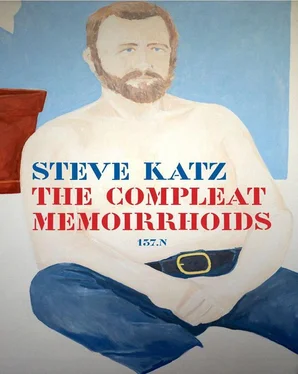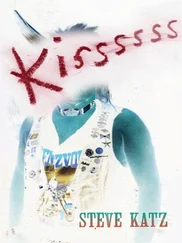“Hey, babbadoo,” he looked at me with that toothy Louie Armstrong smile. “Look at that. You got bigger jugs than I do.” He grabbed my tit. I’d always been self-conscious about my flabby chest. I don’t know what color I turned. He was carrying only his trumpet case. I reached out to carry it for him, but he pulled it back. We got in a cab for Bailey Hall.
“Come on with me,” he said. He grabbed my sleeve and led me backstage. “Velma,” he said, as he pulled me into the performer’s dressing room. Velma Middleton, singer with the band, sat on a bench, staring at the floor. “Look at this boy, Velma. He got bigger tits than you do.” Velma looked up at me, a perfunctory smile on her face. “Sure do.” Louie let go of me then, and I creeped backwards into my humiliation out of the room. I crossed the stage behind the curtain and went into the packed auditorium.
The concert had sold out. Ross Firestone wasn’t there. I would have preferred to leave. They gave a great concert. I enjoyed it more than I was prepared to. Louie’s bright hot trumpet sound and his abrasion of a voice against Velma’s easy blues styling brought the crowd to its feet. I kept thinking I’d rather be listening to Miles, or to Clifford Brown, to Fats Navarro, Dizzy, Little Jazz Roy Eldridge, even Red Rodney, Freddy Hubbard, Lee Morgan, Woody Shaw, anyone else who hadn’t so diminished me. I arranged for Pops’s cab back to the station, but didn’t ride with him. He took the last train back to New York City.
Baxter Hathaway was a slim, grey-haired professor, who in his youth had been a pole-vaulter back in Michigan, setting state records. When I met him as a student at Cornell he was a championship chain-smoker, and committed coffee drinker, always ready to take a break with his writing students, go down to “The Straight,” or Noyes Lodge, and grind out a conversation in his slow, nasal, Midwestern drawl. You could finish your donut and your coffee in the humming pause between Baxter’s first sound, indicating his intention to speak, and the first complete word. Patience was what you needed to listen through the long intervals as he sucked on a cigarette, hummed, and floated equivocating phrases like, “Well, no, on the other hand, you can think about this in another way….” His dilation was an effective process, that honored the mercurial thoughts and amorphous opinions of his protégés, and got them to slow down and burnish their thoughts. He had published one novel and a book of poems, and he continued to write poetry, but spent most of his time writing about transformational syntax and Italian Renaissance literary criticism. His talent for encouraging young writers was an ability to be present, but to stay out of the way. I had, out of self-ignorance, enrolled in the Agriculture School, a pre-vet curriculum, a decision of convenience, since the Ag school was free. Equally ignorant was my decision to transfer to Liberal Arts. I couldn’t afford it, had to wait tables many hours to pay. I did it to pursue my writing, but was bumbling in my aspirations. Baxter Hathaway’s solid avuncular presence, and his soft advice, helped me to clarify my ambition. The last time I saw him he was at home in an oxygen tent, dying of emphysema or lung cancer, the condition exacerbated by cigarettes. He shut off the oxygen to have a smoke and greet me.
My roommate sophomore year was Peter Dean, who transferred next year to Wisconsin where he studied geology, and taught himself to paint, sneaking instruction from life classes where he posed as a model. He moved to Brazil as a geologist, then back to New York City with a day job testing substrates for a road crew. Eventually he painted full time his blazing impasto landscapes and expressionist fantasies. He will some day be recognized as one of the great colorists of the twentieth century. Good writers were hatching then around Cornell. Ron Sukenick, who became the pope of post-modernism, was two years ahead of me. Susan Brownmiller, great feminist writer, author of Against Our Will , was already famous for her defiance of dorm curfew rules, climbing out of her window on a rope made of sheets. After four years in the navy, a year behind me in school, Thomas Pynchon had begun to fashion his literary juggernaut, chumming with Richard Fariña. Steve Reich, who became a seminal minimalist composer, studied Wittgenstein, read Pound and Williams, and never got over it, played drums with the Joe Kurdle quartet. Harold Schimmel, whom Nabokov went out of his way to contact after reading a couple of his poems in the student literary magazine, was a close friend. We later lived near each other in Lecce, in the heel of the Italian boot, teaching English at a USIS school. He later emigrated to Israel, as much out of lust for Mediterranean sun as from his commitment to Judaism. He writes now in Hebrew. W.D. Snodgrass taught there, and impressed me by crying at a reading he gave of Heart’s Needle . He won the Pulitzer for that book.
The artistic fertility of that scene was always nourished by Baxter’s slow, open enthusiasm. It was in that atmosphere, for which he was in large part responsible, that he and his colleagues founded Epoch Magazine , one of the most enduring non-commercial small journals in the USA, and kept it going with garage sales and private donations. Here he founded the Cornell Writing Program, somewhat in opposition to the more corporate Iowa program. Anyone who was ever drawn into the slow meander of conversation with Baxter can only be astounded at his clear accomplishments.
The Aussie couple sitting across from me at a table in Athens’s Syntagma Square complains about the pollution in the city. There is some deep smog. “We can hardly see the Acropolis.” She waves her arm. “What good is the Parthenon if we can’t see? Or the other one, Erec… something.” I’m drinking the Ouzo, and they’re drinking Amstel, and we share a bowl of pistachios. She’s an Anglo and her squeeze is East Indian. They took this trip at the last minute, and seem to be regretting it. “Sydney is very beautiful,” he says. “So clean. The harbor and the opera house. We love Sydney.” Maybe they’re married. “I’ve never been there,” I say. “Though I’ve been to Sydney on Cape Breton Island.” They looked at me sideways. “You have to come to Sydney. The real one down under. No pollution. Not like this.” The milky ouzo licorice tastes cool at the tongue and hot as it slides down. I feel almost coerced to promote Denver, or New York City, but it seems irrelevant; after all, we’re in Athens.
Suddenly a wave of agitation ripples across the people settled in the wide square. Some start to stir, rise from their tables, many toss their payment on the table and leave. When information gets to us the Australians immediately gather their stuff. They’d come to Athens only on a whim after all and now… the news is out that Reagan and the US have just bombed Libya. For a lot of the tourists Libya is too close for comfort. The Aussies throw everything into their backpacks and disappear without goodbye, without acknowledging that we have been engaged in a more or less pleasant conversation. It is as if the event has made them averse to, even ready to erase American contact. I bet they are on a plane back to Sydney by morning. I take another ouzo, and finish the pistachios. The Athens evening settles smoky and soft, revealing the Acropolis above, even a dim Parthenon in the haze.
Since the rise of US militarism, particularly since Vietnam, I feel uneasy traveling in the American skin. Military action has a lockhold on the manifest destiny, and the US takes a mad dog, a brutal imperialist stance in the world. We’ve ignored the warning of President/General Dwight D. Eisenhower about the military industrial complex. We are almost totally in that grip. Although it’s rare that my friends abroad blame me, in general America doesn’t have many sympathizers, and when I tell people I’m American I wait for the onslaught. Sometimes I say I’m Canadian. Though Canadian is not perfect, its heart beats more gently in the world. My American Legion father often insisted, “My country right or wrong, my country.” I can’t live with that. When “my country” is wrong, it’s important to try to correct it. I feel comfortable and real in the Cape Breton Skin. I spent a lot of time there, in Nova Scotia, with my kids, and alone, and occasionally I claim it as my own.
Читать дальше












